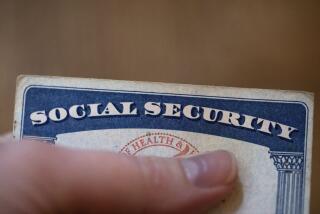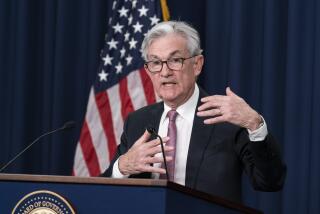Bush Defends Lawmakers’ Pay Raise : Calls Salary Hike ‘Overdue’ in Surprise News Conference
- Share via
WASHINGTON — President Bush defended a widely criticized pay raise for Congress on Friday as unquestionably “overdue.” Making his debut in a fast-paced but easygoing news conference, Bush also said that “prudence is the order of the day” in dealing with the Soviet Union.
Rounding out the first week of his presidency, Bush put himself at arms length from a controversial Treasury Department plan to rescue the beleaguered savings and loan industry by imposing a fee on savings accounts. He called it “an option, not a proposal.”
As for his promise not to raise taxes, Bush said, “I’d like it to be a four-year pledge.” Asked if Ronald Reagan was cashing in on the presidency by signing a reported $5-million book deal and getting paid more than $40,000 for speeches, Bush said, “There is plenty of tradition that goes with presidents writing memoirs and being paid for it.”
43-Minute Conference
His voice was hoarse from a cold but Bush seemed confident, relaxed and in high spirits as he fielded questions in the White House briefing room for 43 minutes--a contrast to the 30-minute time limit fixed for Reagan’s infrequent news conferences.
Whereas Reagan held most of his news conferences in prime-time hours of television, Bush surprised the press with a hurriedly announced session that began at 8:02 a.m. PST. It was broadcast live nationally. White House aides said Bush decided on the spur of the moment Friday morning to see reporters.
Reflecting on a week marred by policy and personnel flaps, Bush said, “I’m just getting a preview of coming attractions, and it’s been lovely. And it’s going to change, I know, but no, I think it’s been a wonderfully harmonious week and these are just little ripples on the surface of an otherwise calm pond.”
Several times Bush was asked about the 50% pay raise to take effect Feb. 8 that would bring salaries for members of Congress to $135,000 a year. Polls show that an overwhelming majority of Americans oppose the increase.
Congressional Vote Unlikely
Taking the opposite side, Bush said, “A raise is overdue, there’s no question about that.” Although saying there are some unspecified aspects of the pay formula that disturb him, Bush said, “I still feel that I should not go about undoing the Reagan decision” to endorse the pay increase.
Ideally, he said, the Senate and House would vote on the issue, although that appears highly unlikely.
On foreign policy, Bush said he was not trying to send any kind of signal by visiting China next month ahead of any meeting with Soviet President Mikhail S. Gorbachev. He said the stop in Beijing “just seemed like an appropriate visit” since he would be in Asia for the funeral in Tokyo of Emperor Hirohito.
Bush announced that he will make a “relatively brief” stop in South Korea--probably several hours--on Feb. 26 on the way home from China.
Bush said the Administration was reassessing all aspects of U.S.-Soviet relations and “let’s take our time now. . . . I don’t think the Soviets see that as foot-dragging. I’m confident they don’t.” Bush said he made that point clear last week in a telephone call with the Soviet leader.
Avoids the Words
Asked if he believed there still is a “Cold War” between Moscow and Washington--as White House national security adviser Brent Scowcroft said recently--Bush said he wanted to avoid those words because of their implication.
“If someone says ‘Cold War’ to me, that doesn’t properly give credit to the advances that have taken place in this relationship,” the President said. “So I wouldn’t use that term. But if it’s used in the context of, are we still unsure of--in our predictions on Soviet intentions--I’d have to say, yes, we should be cautious.”
Ironically, Scowcroft’s words had merely echoed a sentiment expressed by Bush in a speech last June 29, when he declared: “The Cold War is not over.”
In his news conference, Bush said he wanted to take the offense on foreign policy rather than merely react to moves by the Soviets. “We’re going to be out front. . . . I don’t want to play defense . . . just waiting around to, you know, let others set the agenda. But prudence is the order of the day.”
Iran’s Influence
On other points, Bush:
- Said he believes Iran “can have an influence” in winning the release of the American hostages in Lebanon even though it does not actually hold them. On a conciliatory note, Bush said, “There was a period of time when we had excellent relations with Iran, and I don’t want to think that the status quo has to go on forever.”
- Offered his first reaction to a Supreme Court decision that sharply restricted the ability of state and local governments to reserve a fixed percentage of contracts for minority businesses without proof of past discrimination. Bush said, “I will not read into that a mandate to me to stop trying on equal employment and on affirmative action generally,” he said.
- Defended his decision not to make former Education Secretary William Bennett a full member of the Cabinet even though he has Cabinet-level rank as point man in the battle against drugs. Bush said that he wanted to reduce the size of the Cabinet and that Bennett’s time “is best spent not worrying about agricultural subsidies.” Bush said he would insist that every member of the Cabinet cooperate with Bennett.
- Said that Federal Reserve Chairman Alan Greenspan “is more concerned about inflationary pressures than I am right now” and said that was “an area of difference” between them.
More to Read
Sign up for Essential California
The most important California stories and recommendations in your inbox every morning.
You may occasionally receive promotional content from the Los Angeles Times.












